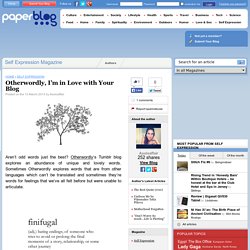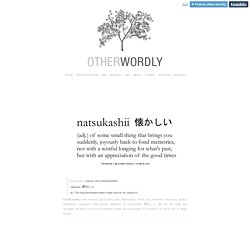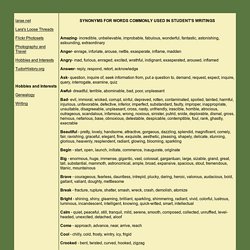

Lh3.googleusercontent.com. Important Infrequently Used Words To Know. Paul V.

Hartman (The Capitalized syllable gets the emphasis) alacrity a-LACK-ra-tee cheerful willingness and promptnessanathema a-NATH-a-ma a thing or person cursed, banned, or reviledanodyne AN-a-dine not likely to cause offence or disagreement and somewhat dull//anything that sooths or comfortsaphorism AFF-oar-ism a short, witty saying or concise principleapostate ah-POSS-tate (also: apostasy) person who has left the fold or deserted the faith.arrogate ARROW-gate to make an unreasonable claimatavistic at-a-VIS-tic reverting to a primitive typeavuncular a-VUNC-you-lar “like an uncle”; benevolent bathos BATH-ose an anticlimaxbereft ba-REFT to be deprived of something valuable “He was bereft of reason.”
Otherwordly, I’m in Love with Your Blog - Paperblog. Aren’t odd words just the best?

Otherwordly‘s Tumblr blog explores an abundance of unique and lovely words. Sometimes Otherwordly explores words that are from other languages which can’t be translated and sometimes they’re words for feelings that we’ve all felt before but were unable to articulate. Sigh… I’m so in love with this blog. Check it out and tell me your thoughts!! The Dictionary of Obscure Sorrows.
23 Perfect Words For Emotions You Never Realised Anyone Else Felt. 24 Perfect Word Pairs You Need To Say Out Loud. 28 Beautiful Words The English Language Should Steal. 14 Perfect Japanese Words You Need In Your Life. Elfdalian, the Ancient Viking Forest Language of Sweden, Set to be Revived. The ancient Viking language of Elfdalian has been almost entirely wiped out, with only 2,500 people in a tiny forest community in Sweden currently keeping it alive.

Now people fight to revive the historic tongue by bringing it back to schools before it vanishes completely. The Conversation reports that the ancient dialect of Elfdalian ( älvdalska in Swedish and övdalsk in the language itself) was a vigorous language until well into the 20th century. Sounding to listeners like a beautiful and complex language as spoken by the Elven race in fantasy epics, Elfdalian is actually derived from Old Norse, the language of the Vikings. However, it is radically different from Swedish, writes University of Copenhagen linguist Dr. Guus Kroonen. He explains that it “sounds like something you would more likely encounter in Tolkien’s Lord of the Rings rather than in a remote Swedish forest.” Elfdalian is unique among Nordic languages, expressing itself with different tones and sounds. The Seven Sins of Our System of Forced Education. Peter Gray, Ph.D., GuestWaking Times Forced education interferes with children’s abilities to educate themselves.

Language as a tool of enslavement... Have you wondered why we all spell things the same way, well not quite, as in England we spell things differently from the States - same with Spanish from Spain and Spanish from South America, but generally it's pretty uniform.

Also, did you know that the structuring of sentences (e.g. some people beLIEve that a sentence MUST have a subject, verb, and no more than one adjective... must all be in the same tense... and same "person")... is a very recent invention? It blocks the free flow of information and energy behind the words. Not only of writing it, but also of it being received. If the writing has "mistakes" or "errors", a person stuck in the "grammar matrix" will not be able to understand it, or will get terribly distracted by these "errors in grammar" and miss the point, thought, or energy being carried in the piece they were reading.
The Conspiracy of Language. Zen Gardner, GuestWaking Times Here’s a good exercise that will help alter your conscious awareness and put punch and clarity where slosh once existed.

Don’t even use the words “hope” or “believe”. Otherwordly. Pronunciation | nats-ka-‘shE (nahtzkah-SHEE)Japanese | 懐かしいtip | The final pronunciation doesn’t really have an “oo” sound in it. pronunciation | swon-‘nyA Anonymous asked: What is Zealous?

Help! Define Supplant at Dictionary.com. 45 ways to avoid using the word 'very'. Three Telling Quotes About ‘Very’ Substitute ‘damn’ every time you’re inclined to write ‘very;’ your editor will delete it and the writing will be just as it should be.

~Mark Twain‘Very’ is the most useless word in the English language and can always come out. 117 Most beautiful words in the English language. 100 Exquisite Adjectives. By Mark Nichol Adjectives — descriptive words that modify nouns — often come under fire for their cluttering quality, but often it’s quality, not quantity, that is the issue.

Plenty of tired adjectives are available to spoil a good sentence, but when you find just the right word for the job, enrichment ensues. Practice precision when you select words. Synonyms for words commonly used in student's writing. Amazing- incredible, unbelievable, improbable, fabulous, wonderful, fantastic, astonishing, astounding, extraordinary Anger- enrage, infuriate, arouse, nettle, exasperate, inflame, madden.

26 Beatnik Slang Words and Phrases We Should All Start Using. Shakespeare Insult Kit. Shakespeare Insult Kit Since 1996, the origin of this kit was listed as anonymous. It came to me on a piece of paper in the 90's with no attribution, and I thought it would make a cool web page. Though I searched for the origin, I could never find it. In 2014, Lara M informed found the originating author. 20 Common Grammar Mistakes That (Almost) Everyone Makes.
I’ve edited a monthly magazine for more than six years, and it’s a job that’s come with more frustration than reward. If there’s one thing I am grateful for — and it sure isn’t the pay — it’s that my work has allowed endless time to hone my craft to Louis Skolnick levels of grammar geekery. As someone who slings red ink for a living, let me tell you: grammar is an ultra-micro component in the larger picture; it lies somewhere in the final steps of the editing trail; and as such it’s an overrated quasi-irrelevancy in the creative process, perpetuated into importance primarily by bitter nerds who accumulate tweed jackets and crippling inferiority complexes. 100 Most beautiful words in the English language* Reading_Test.jpg (JPEG-bilde, 575x600 punkter) What phrases are included in Phrasefinder Database? The database is made from phrases, sayings and idioms that are in common use in English.
That includes anything that most people will have heard before and will recognise the meaning of. For instance: The many thousands of phrases that are used every day in colloquial speech, like 'the whole nine yards', 'go for it' and 'kiss and make up'. Proverbs, like 'never judge a book by its cover' and 'if life deals you lemons make lemonade'.
Song, book and film titles that have entered the language, like 'All You Need is Love', 'Brave New World' and 'Some Like it Hot'. The list is long and comprehensive and currently contains 17,000 entries. Try our sample search. List of idioms in the English language. This is a list of notable idioms in the English language.
An idiom is a common word or phrase with a culturally understood meaning that differs from what its composite words' denotations would suggest. For example, an English speaker would understand the phrase "kick the bucket" to mean "to die" – and also to actually kick a bucket. Furthermore, they would understand when each meaning is being used in context. An idiom is not to be confused with other figures of speech such as a metaphor, which invokes an image by use of implicit comparisons (e.g., "the man of steel" ); a simile, which invokes an image by use of explicit comparisons (e.g., "faster than a speeding bullet"); and hyperbole, which exaggerates an image beyond truthfulness (e.g., like "missed by a mile" ).
The Top 10 Relationship Words That Aren't Translatable Into English. Here are my top ten words, compiled from online collections, to describe love, desire and relationships that have no real English translation, but that capture subtle realities that even we English speakers have felt once or twice. As I came across these words I’d have the occasional epiphany: “Oh yeah! That’s what I was feeling...” Mamihlapinatapei (Yagan, an indigenous language of Tierra del Fuego): The wordless yet meaningful look shared by two people who desire to initiate something, but are both reluctant to start. Oh yes, this is an exquisite word, compressing a thrilling and scary relationship moment.